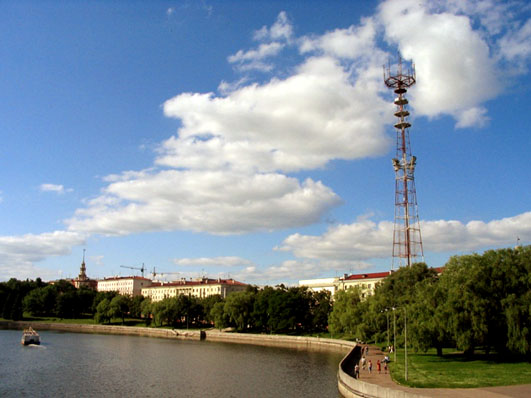
Belarus Starts Propaganda War Against the EU
Publication: Eurasia Daily Monitor Volume: 10 Issue: 11
By:

The showing of the documentary “Pseudomodern” on Belarusian State Television’s Channel One on December 16, 2012 (https://www.youtube.com/watch?feature=player_embedded&v=zzhj-z_O_sE), ignited angry responses from Brussels and defiance from the Belarusian State Television and Radio Company, which has accused the Europeans of trying to subjugate Belarus by privatizing its companies and replacing the Lukashenka regime with an alternative pro-Western government.
The unexpected attack was the most overt since the news program Panorama featured in 1999 a scurrilous documentary on Hans-Georg Wieck, former head of the Organization for Security and Cooperation in Europe (OSCE) Mission in Minsk in the late 1990s. The ostensible premise of “Psuedomodern” was an expose of the European Dialogue on Modernization with Belarus project, which was initiated by the Czech diplomat Štefan Füle, the European Commissioner for Enlargement and European Neighborhood Policy, on March 29, 2012 (https://europa.eu/rapid/press-release_MEMO-12-226_en.htm). It is the first major European Union initiative in Belarus since the foundation of the Eastern Partnership (EaP) project almost four years ago.
The program was shown exclusively to an internal audience, though it has since appeared on YouTube. It raised the question: “What lies behind the new project of the European bureaucracy?” In reply, it maintained that some $11.9 billion had been allocated to the project, even though Brussels had tried and failed to come up with only $798,300 to develop all six countries in the EaP. It then deployed two strategies to discredit the new EU initiative: brief, edited statements from local and foreign experts supporting the position of the Belarusian authorities; and depicting the members of the opposition in the worst possible light as penniless, jobless, and lacking any domestic support. It ended by portraying the Belarusian economy and army in glowing terms.
Included among the local experts interviewed on the documentary were political scientists Elena Ponomareva and Yuri Shevtsov, and Vadim Gigin, Executive Secretary of the Belarusian Union of Journalists and editor of the journal Belaruskaya Dumka. Gigin was particularly outspoken, alleging that the Europeans were attempting a “bureaucratic revolution” to subvert the system from within using “agents of influence.” The participants in his view intended to overthrow the country, being driven by “revenge and personal ambitions.” Later he noted that the goal of the EU and the “Great West” was the “removal of [Belarusian President Alyaksandr] Lukashenka from power and the elimination of the political system created over the previous fifteen years.
The foreign experts included Alexander Rahr from the German Council on Foreign Relations, who has maintained elsewhere that there is a professional lobby within Europe with a vested interest in creating a negative impression of Belarus. “The country,” he said “has been developing in a manner completely different from the West” and requires “slightly more time” rather than being lectured like an errant schoolboy” (Belarusian Telegraph Agency, August 10, 2012). Also featured in the program was Johan Galtung, director of the Institute for Global Theory and Practice for Peace (Norway and Switzerland) who declared that the main fault of Belarus in the eyes of the Europeans was its refusal to submit to economic interventions. Professor Richard Falk, well known for his support of the Palestinian movement Hamas, reflected on the follies of international law, and said that small countries could be sacrificed. He compared the proposed reforms in Belarus to former Soviet leader Mikhail Gorbachev’s ill-fated Perestroika.
Among the opposition, the program’s reporters relied on “hidden cameras” at meetings in Brussels, the presence of which was not explained. This footage featured former chairman of the parliament Stanislau Shushkevich; former presidential candidate of the unified opposition in 2006 Alyaksandr Milikevich; Professor Mikhail Pastukhov, a former judge of the Constitutional Court; Alyaksei Pikulik, academic director of the Belarusian Institute of Strategic Studies; and Uladzimir Matskevich, head of the board of the International Consortium, “EuroBelarus.” The opposition representatives are shown bickering over which was the leading “non-governmental organization,” and acknowledging that if the Lukashenka regime collapsed, there would be nothing with which to replace it.
The impression created, therefore, in the minds of an audience largely ignorant of the machinations of European structures, was of a fifth column of unpopular, dysfunctional subversives collaborating with a plan to transform Belarus, install a new government, and then impose its own economic strictures on the country. Though in some respects crude, as a propaganda device the program was quite effective, despite its many obvious fallacies that have since been pointed out, inter alia, by the Delegation of the EU to Minsk and the EU-country embassies in Minsk (Belapan, December 24, 2012). The key question is what the program reveals about current thinking within the Belarusian leadership.
Its screening coincides with what analyst Alyaksei Miadzvecki describes as an “ongoing cleanup” of the elites responsible for the “dialogue with the West” project in 2008–2010. In his view the team led by former Foreign Minister Siarhei Martynau failed to achieve any progress and therefore had to be replaced (https://nmnby.eu/news/express/5052.html). Important in this regard has been the return to prominence of Viktar Sheiman, in his latest role as “special aide to the president.” Analyst Sviatlina Kalinkina comments that he will be close to Lukashenka, alongside the president’s son Viktar, suggesting some “hidden fears” at the top (https://www.svaboda.org/content/article/24818216.html).
It would be simplistic, however, to deduce that Minsk has simply turned its back on Europe and is likely to play a more active role henceforth in Russian-led structures. It may reflect some fears of the new EU initiative, but it may simply be a temporary strategy reflecting the recent decision between Russia and Belarus to expand trade by more than ten percent (BTA, January 16) as well as the Moscow summit between presidents Lukashenka and Vladimir Putin that coincided with the showing of the state TV program. Belarus’s exports to the EU comprised almost 40 percent of the country’s total last year, while EU companies accounted for 50 percent of foreign investment (BTA, January 14). The EU is too important to be readily discarded. Rather, Minsk would like a stronger position from which to bargain.




